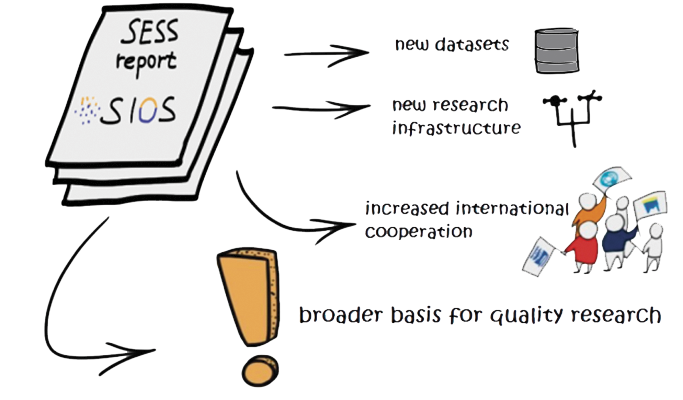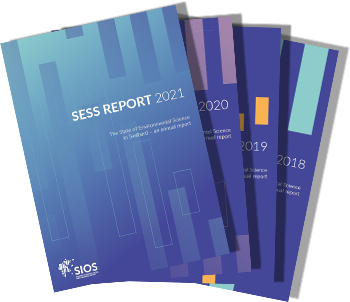The State of Environmental Science in Svalbard (SESS) report is an annual report published by SIOS.
- Purpose of the SESS report
-
The SESS report:
- is established as an authoritative source of information about the state of the environment in and around Svalbard;
- is an important tool to convey knowledge to stakeholders and the public;
- addresses the scientific community, as well as stakeholders and the public. This format ensures that there is synergy between the scientific investigations and the knowledge needed by society to sustainably develop and safeguard the Arctic environment;
- is the main driving force for the science-based development of the observing system and represents an opportunity for research groups to actively influence the prioritisation within SIOS.
- Open sharing of ideas -
The report is an arena for open sharing of ideas and discussions on measures that should be taken to enable scientists to provide observations needed to gain a holistic view of the Earth System of Svalbard and the Arctic in general.
Contributions to the SESS report are written by international and, preferably, multidisciplinary teams under the lead of researchers from SIOS member institutions. All chapters are peer-reviewed and subject to final approval by an editorial board. The editorial board consists of two senior researchers, one early career researcher and two representatives of the SIOS Knowledge Centre.
The report summarises the state of current knowledge of key Earth System Science parameters and analyses how these parameters influence one another. It combines the long-term monitoring data that form the core of the observing system with innovative monitoring and research.
In addition to evaluating the state of current knowledge, the SESS report highlights questions that remain unanswered and recommends solutions in terms of research infrastructure improvements and research priorities.
- Calls for updates and new chapters
-
In order to strengthen the role of the SESS report as main driving force for the science-based development of the observing system, we annually invite authors from previous chapters to submit updates to their chapters. Calls for new chapters will be issued every second year. Such, the recommendations and research needs of current contributions to the SESS report can be put in stronger focus and ways to implement actions better discussed.
- SESS recommendations synthesis report
-
The first SESS recommendations synthesis report was prepared and made available to the SIOS community in Q4/2022 (see right-hand menu). The document provides an overview of the outcomes of the 40 chapters and 169 recommendations from the first four SESS reports (2018-2021). We have condensed these into disciplinary recommendations and identified the major cross-cutting interdisciplinary steps forward for SIOS. Recommendations mainly concern developing the observation system and the data management system. Naturally, this first review also allows for a thorough discussion of how far SIOS has come in developing a full-scale interdisciplinary Earth System Science (ESS) observation system and identifies potential ways forward.
This synthesis report will be revised and updated to reflect the developed understanding of the State of Environmental Science in Svalbard as new SESS report chapters are published. The interval between the preparation of these synthesis reports has not been defined, and initiation of the next one will be guided by SOAG.
SESS report 2024In progress |
SESS report 2023Issue 6, publ. January 2024 |
SESS report 2022Issue 5, publ. January 2023 |
|
SESS report 2021Issue 4, publ. January 2022 |
SESS report 2020Issue 3, publ. January 2021 |
SESS report 2019Issue 2, publ. January 2020 |
SESS report 2018Issue 1, publ. January 2019 |

SIOS promotes scientific innovation and sees cooperation across nations and disciplines as an important means to this end. By improving access to new and existing monitoring data, prioritising investment in new research infrastructure and strengthening collaboration, SIOS promotes innovative solutions to answering the big questions in Arctic Earth System Science. The SESS report is the main medium used to achieve this aim.




























